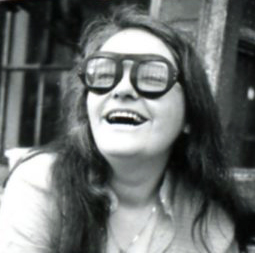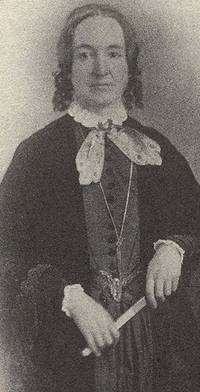Involuntary commitment, civil commitment, or involuntary hospitalization/hospitalisation is a legal process through which an individual who is deemed by a qualified person to have symptoms of severe mental disorder is detained in a psychiatric hospital (inpatient) where they can be treated involuntarily. This treatment may involve the administration of psychoactive drugs, including involuntary administration. In many jurisdictions, people diagnosed with mental health disorders can also be forced to undergo treatment while in the community; this is sometimes referred to as outpatient commitment and shares legal processes with commitment.

Kay Redfield Jamison is an American clinical psychologist and writer. Her work has centered on bipolar disorder, which she has had since her early adulthood. She holds the post of the Dalio Professor in Mood Disorders and Psychiatry at Johns Hopkins University School of Medicine and is an Honorary Professor of English at the University of St Andrews.

A psychiatric hospital, also known as a mental health hospital, or a behavioral health hospital, is a specialized medical facility that focuses on the treatment of severe mental disorders. These institutions cater to patients with conditions such as schizophrenia, bipolar disorder, major depressive disorder, and eating disorders, among others.
Anti-psychiatry, sometimes spelled antipsychiatry, is a movement based on the view that psychiatric treatment can be often more damaging than helpful to patients. The term anti-psychiatry was coined in 1912, and the movement emerged in the 1960s, highlighting controversies about psychiatry. Objections include the reliability of psychiatric diagnosis, the questionable effectiveness and harm associated with psychiatric medications, the failure of psychiatry to demonstrate any disease treatment mechanism for psychiatric medication effects, and legal concerns about equal human rights and civil freedom being nullified by the presence of diagnosis. Historical critiques of psychiatry came to light after focus on the extreme harms associated with electroconvulsive therapy and insulin shock therapy. The term "anti-psychiatry" is in dispute and often used to dismiss all critics of psychiatry, many of whom agree that a specialized role of helper for people in emotional distress may at times be appropriate, and allow for individual choice around treatment decisions.

Thomas Stephen Szasz was a Hungarian-American academic and psychiatrist. He served for most of his career as professor of psychiatry at the State University of New York Upstate Medical University. A distinguished lifetime fellow of the American Psychiatric Association and a life member of the American Psychoanalytic Association, he was best known as a social critic of the moral and scientific foundations of psychiatry, as what he saw as the social control aims of medicine in modern society, as well as scientism.

Katherine Murray Millett was an American feminist writer, educator, artist, and activist. She attended the University of Oxford and was the first American woman to be awarded a degree with first-class honors after studying at St Hilda's College, Oxford. She has been described as "a seminal influence on second-wave feminism", and is best known for her book Sexual Politics (1970), which was based on her doctoral dissertation at Columbia University. Journalist Liza Featherstone attributes the attainment of previously unimaginable "legal abortion, greater professional equality between the sexes, and a sexual freedom" in part to Millett's efforts.

Elizabeth Parsons Ware Packard, also known as E.P.W. Packard, was an American advocate for the rights of women and people perceived to have insanity. She was wrongfully committed to an insane asylum by her husband, who claimed that she had been insane for more than three years. At her trial, however, a jury concluded that she was not insane after only seven minutes of deliberation. She later founded the Anti-Insane Asylum Society, campaigning for divorced women to retain custody of their children.
MindFreedom International is an international coalition of over one hundred grassroots groups and thousands of individual members from fourteen nations. Based in the United States, it was founded in 1990 to advocate against forced medication, medical restraints, and involuntary electroconvulsive therapy. Its stated mission is to protect the rights of people who have been labeled with psychiatric disorders. Membership is open to anyone who supports human rights, including mental health professionals, advocates, activists, and family members. MindFreedom has been recognized by the United Nations Economic and Social Council as a human rights NGO with Consultative Roster Status.

The Best Awful There Is, is a 2004 novel by actress and author Carrie Fisher. It is a sequel to her debut novel Postcards from the Edge.
Norah Mary Vincent was an American writer. She was a weekly columnist for the Los Angeles Times and a quarterly columnist on politics and culture for the national gay news magazine The Advocate. She was a columnist for The Village Voice and Salon.com. Her writing appeared in The New Republic, The New York Times, New York Post, The Washington Post and other periodicals. She gained particular attention in 2006 for her book Self-Made Man, detailing her experiences when she lived as a man for eighteen months.

The Last Party: Scenes From My Life with Norman Mailer is a 1997 book by Adele Morales, second wife of Norman Mailer, whom she married in 1954. It was published in the US by Barricade Books.

An Unquiet Mind: A Memoir of Moods and Madness is a memoir written by American clinical psychologist and bipolar disorder researcher Kay Redfield Jamison and published in 1995. The book details Jamison's experience with bipolar disorder and how it affected her in various areas of her life from childhood up until the writing of the book. Narrated in the first person, the book shows the effect of manic-depressive illness in family and romantic relationships, professional life, and self-awareness, and highlights both the detrimental effects of the illness and the few positive ones. The book was originally published in hardcover by Alfred A. Knopf, Inc. in New York and reprinted by Vintage Books in paperback in 1997.

Judi Chamberlin was an American activist, leader, organizer, public speaker and educator in the psychiatric survivors movement. Her political activism followed her involuntary confinement in a psychiatric facility in the 1960s. She was the author of On Our Own: Patient-Controlled Alternatives to the Mental Health System, which is a foundational text in the Mad Pride movement.

Psychiatry is the medical specialty devoted to the diagnosis, prevention, and treatment of deleterious mental conditions. These include various matters related to mood, behaviour, cognition, perceptions, and emotions.
Linda Andre was an American psychiatric survivor activist and writer, living in New York City, who was the director of the Committee for Truth in Psychiatry (CTIP), an organization founded by Marilyn Rice in 1984 to encourage the U.S. Food and Drug Administration (FDA) to regulate electroconvulsive therapy (ECT) machines.

Peter Lehmann, D. Phil. h.c., is an author, social scientist, publisher, and an independent freelance activist in humanistic anti-psychiatry, living in Berlin, Germany.
Joanna Moncrieff is a British psychiatrist and academic. She is Professor of Critical and Social Psychiatry at University College London and a leading figure in the Critical Psychiatry Network. She is a prominent critic of the modern 'psychopharmacological' model of mental disorder and drug treatment, and the role of the pharmaceutical industry. She has written papers, books and blogs on the use and over-use of drug treatment for mental health problems, the mechanism of action of psychiatric drugs, their subjective and psychoactive effects, the history of drug treatment, and the evidence for its benefits and harms. She also writes on the history and politics of psychiatry more generally. Her best known books are The Myth of the Chemical Cure and The Bitterest Pills.
Kate Richards is an Australian writer, doctor and medical researcher. She writes and speaks about her experiences with mental illness, and is the author of two books on the subject.
Ronald Robert Fieve was an American psychiatrist known for his work on the use of lithium in treatment of mood disorders. He has authored four popular science books, "Moodswing", "Bipolar II", "Prozac" and "Bipolar Breakthrough".












